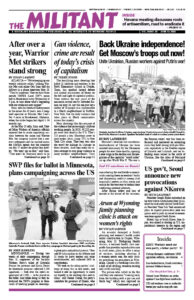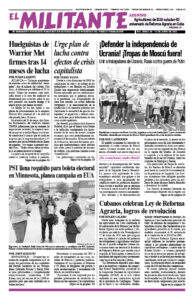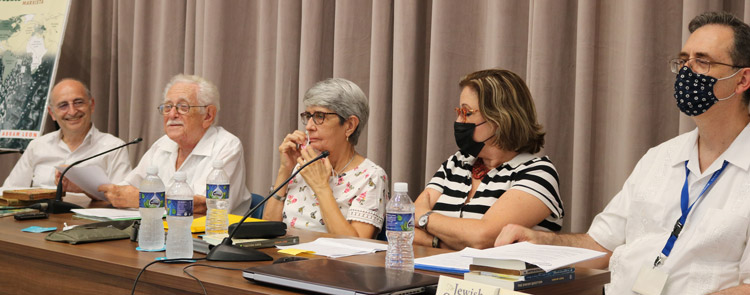HAVANA — “The Jewish Question: A Marxist Interpretation is an important contribution by the revolutionary fighter Abram Leon,” said José Altshuler. “He wrote it to explain the foundations of anti-Jewish hatred in the imperialist epoch and the road to its eradication, as David Prince tells us in the introduction.”
Altshuler, president of the Cuban Association on the History of Science and Technology for many years and frequent speaker on Jewish and Cuban history, was speaking on a panel that launched Pathfinder Press’s new edition of that book during the Havana International Book Fair.
He was joined on the panel by Maritza Corrales, author of The Chosen Island: Jews in Cuba; Adriana Hernández, a professor at Havana’s San Gerónimo College; and Martín Koppel, a member of the Socialist Workers Party and editor of the Spanish-language translation of the book.
Among the 50 people attending the April 27 event were members of the local Jewish community, including leadership delegations from the three synagogues in Havana: the Sephardic Jewish Center, Adath Israel, and Beth Shalom, known as the Patronato. Others present included retired brigadier general Gustavo Chui; longtime revolutionary combatant Víctor Dreke; José Ramón Cabañas, former Cuban ambassador to the United States and director of Cuba’s International Policy Research Center; and Graciela Chailloux, historian and editor of De dónde son los cubanos (Where Cubans Are From).
Eager to understand today’s world
The Jewish Question was the highest-selling Pathfinder title at the book fair and sold out before the end of the 10-day event. One person after another remarked, “I know very little about this subject, but I’m really interested in learning about it.”
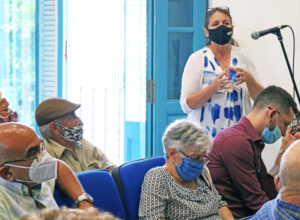
Those sales registered a broader interest expressed by many about understanding the sharpening social and political turmoil in the world today, from Moscow’s war on Ukraine to the capitalist economic crisis and its impact on Cuba and beyond. The most sought-out titles at the Pathfinder stand included “Capitalism’s Long Hot Winter Has Begun,” “U.S. Imperialism Has Lost the Cold War,” and “Washington’s Assault on Iraq: Opening Guns of World War III,” all published in New International magazine, as well as Labor, Nature, and the Evolution of Humanity, which was also launched at the Havana fair.
The fight against Jew-hatred remains a central question today, Altshuler emphasized. “The fact that during World War II, the Nazis exterminated 6 million Jews in concentration and death camps, including the author of this book, is a clear indication of the importance of this question.” Many of Altshuler’s own close relatives in Poland were murdered by the Nazi regime.
He noted how Leon describes the evolving place of Jews as a commercial “people-class” before the rise of capitalism. The book explains how modern-day antisemitic demagogues distort that history to create a myth of “Jewish capitalism” in order to “divert the masses from their real enemy,” the capitalist ruling class.
In Cuba, Altshuler said, antisemitism was never deeply rooted in the population, but during the 1930s depression, rightist figures like the editor of the newspaper Diario de la Marina decried a “Jewish invasion” by European refugees. Altshuler highlighted a 1939 “Cuban Manifesto Against Antisemitic Racism” signed by prominent figures such as Fernando Ortiz and others associated with the Popular Socialist Party, of which Altshuler was a longtime member.
Record of Cuban Revolution
The leadership of Cuba’s socialist revolution has opposed and combated antisemitism from the start, Altshuler concluded. He noted that Enrique Oltuski, son of Polish Jewish immigrants, “was named the revolution’s first minister of communications” at age 28. Altshuler, an electrical engineer, worked with Oltuski in that ministry and played a prominent part in the development of scientific institutions in Cuba, including as president of Cuba’s National Space Commission.
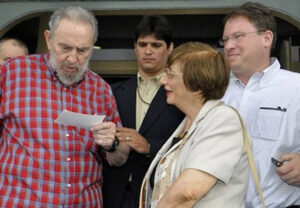
Both Fidel Castro and Raúl Castro, he emphasized, made a point of visiting the main synagogue in Havana on more than one occasion, part of the revolutionary leadership’s record of safeguarding the religious and cultural rights of Jews in Cuba.
Maritza Corrales recalled that when she first read an earlier Spanish-language edition of The Jewish Question many years ago, she was impressed with Abram Leon’s record as a communist. While still in his 20s, she said, Leon had the “theoretical maturity” to write this book and the political capacity “to serve as political secretary of the Revolutionary Communist Party in Belgium, become editor of the newspaper La voie de Lénine [Lenin’s road], and undertake extremely dangerous underground work among the working-class soldiers” of the German occupation army during World War II.
She said Leon reminded her of Julio Antonio Mella, a co-founder of the early Cuban Communist Party in 1925. Both, she noted, “were murdered when they were only 26 years old by totalitarian regimes, those of Gerardo Machado [in Cuba] and Adolf Hitler.”
Jew-hatred by rightists, among left
Today, Corrales said, “it is of deep concern that 2021 has seen the highest number of antisemitic incidents in a decade,” from France and the United Kingdom to the United States. That includes “a 100% increase in New York City, which has a large Jewish population, compared to last year.”
“A particularly troubling development,” she said, “is evident on U.S. university campuses and among left groups in the U.S. and Europe who, in their just defense of Palestinian rights, equate the state of Israel with Jews, provoking attacks and harassment against Jewish students on those campuses” and elsewhere. She also cited the recent example of liberal TV personality Whoopi Goldberg, who dismissed the Holocaust as a dispute between “two white groups of people.”
“I want to thank the compañeros of Pathfinder for publishing this very timely book,” Corrales concluded, and “for remaining true to their revolutionary convictions against all odds and for their determined, unconditional support over the years” to the Cuban Revolution.
Adriana Hernández, author of El antisemitismo en Europa (Antisemitism in Europe), said, “One of the things that motivated me to study antisemitism after World War II was that people tended to think it was a thing of the past. But nothing is further from the truth.”
The book’s introduction, Hernández said, “points out that antisemitic positions have sometimes been adopted by the left,” including under the cover of criticizing policies of the Israeli government. “That’s something very dangerous we must be alert to,” she said.
Hernández praised the quality of the new edition of The Jewish Question, including “its very useful maps and photos.”
Martín Koppel underscored that the new book is an important tool to understand why “Jew-hatred and the fight against it are central questions for the working class the world over.” Today’s rise in anti-Jewish violence and persecution is “fueled by growing class polarization, as the economic and social crises of world capitalism multiply.”
Anti-Jewish actions “do not come from ultra-rightists and jihadists alone,” he said, but today are “growing among the left,” and “among Democratic Party politicians and the liberal media.” Often this “is carried out under the cloak of anti-Zionism.” As an example, Koppel pointed to the Boycott, Divestment, and Sanctions campaign, which seeks to turn Israel and Israeli Jews into pariahs.
Working people, Koppel said, need to recognize the fact of Israel’s existence “and unconditionally support the right of Jews to seek refuge in Israel.” He pointed to Fidel Castro’s leadership over the years in unambiguously explaining the need to oppose Jew-hatred as well as recognize Israel’s right to exist.
“The way forward,” he concluded, “is to emulate the example of Cuba’s socialist revolution. That is, to build proletarian parties, in the U.S. and other countries, that can lead working people in struggles toward taking state power and joining the fight for a socialist world.”
Discussion on Israel, Jew-hatred today
The presentations were followed by a lively exchange of views.
“I am proud to be a Jew living in Cuba, where we can take part in an event like this, where we enjoy freedom and peace that we sometimes take for granted, because we don’t face antisemitism,” said Esther Jequin, president of Havana’s Sephardic Center.
But, she added, “I’m alarmed at the situation we hear about in other countries. We know many Jews are facing difficulties in other countries.” She pointed to the thousands of Jews fleeing Ukraine in face of Moscow’s invasion, and noted that many are seeking refuge in Israel.
Fernando García Bielsa, who for years served as a Cuban diplomat in the U.S., said he came to the book presentation to learn more, but didn’t understand how the international campaign to boycott Israel could be called antisemitic. He said it seemed comparable to the 1980s sanctions campaign waged against the apartheid regime during the revolutionary democratic movement in South Africa. García said he supported the existence of both an Israeli and Palestinian state, but that “to be anti-Zionist is not necessarily to be antisemitic.”
In reply, Koppel said the Boycott, Divestment and Sanctions campaign paints all Israeli Jews as the enemy, and often targets Jewish-owned businesses abroad. Israel is a class-divided society, he noted, and what is needed there, as in other countries, is a perspective to unite working people — Jews, Arabs, Christians, Druze, and immigrants — in struggles for their common interests.
“I am in favor of a Palestinian state” along with Israel, said Hella Esquenazi, who serves as executive secretary of the Patronato. “But there is a very thin line between anti-Zionism and antisemitism.”
She condemned the Iranian government’s support for terrorist attacks on Israel, “which also harm the Palestinian cause.” Only when other governments in the region recognize Israel “will it be possible to open a road to peace” in the Mideast, Esquenazi said.
Rafael Cheni Camps, a biology professor who is a leader of Havana’s Sephardic community, added that Hamas, the governing party in Gaza, calls for the “elimination of Israel and of Jews there.” He endorsed a suggestion by Esquenazi that broader forums to discuss these issues be organized in which representatives of the Jewish community in Cuba can participate.
The exchange and debate continued after the program, as audience members bought copies of The Jewish Question and browsed other books at the Pathfinder table.
Afterward, representatives of the Sephardic Center and the Patronato were delighted to receive copies of a Pathfinder photo display used during the book fair to illustrate the themes of The Jewish Question.
